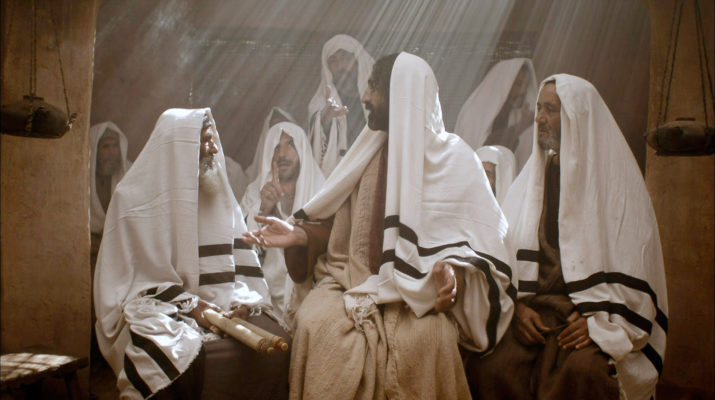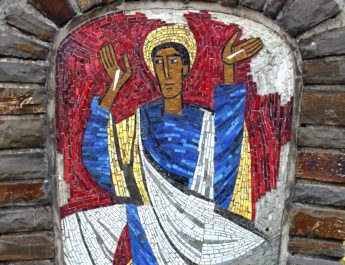Mark 3:20-35
Ordinary B28
Then he went home;A 20 and the crowd came together again, so that they couldB not evenC eat.D
A “home” = oikos. This is house – the building, the household, the family, descendants, the temple.
B “could” = dunamai. This is to be able, or something that is possible. It can also be empowered or being powerful. The Greek word for “miracle” (dunamis) comes from this root.
C {untranslated} = artos. Perhaps from airo (raise, take up, lift, remove). This is bread or a loaf. It is a loaf as raised.
D “eat” = phago. This is to eat or figuratively to consume like rust does.
21 When his familyE heardF it, they went out to restrainG him, for people were saying, “He has gone out of his mind.”H
E “his family” = ho + para + autos. Literally “those belonging to him.”
F “heard” = akouo. This is hear or listen, but it also means to understand by hearing. This is where the word “acoustics” comes from.
G “restrain” = krateo. From kratos (strength, power, dominion; vigor in a literal or figurative sense; power that is exercised). This is being strong or mighty so, by extension, to prevail or rule. It can also mean to seize, grasp hold of and thereby control. In this sense, it means arrest.
H “gone out of his mind” = existemi. 17x in NT. From ek (from, from out of) + histemi (to stand, place, establish, appoint, stand ready, be steadfast). This is to displace or take something or someone from standing. Figuratively, it is to be overwhelmed and flabbergasted – as if beside oneself. By extension, it is astonished, amazed, or mad.
22 And the scribesI who came downJ from JerusalemK said,
I “scribes” = grammateus. From gramma (what is drawn or written so a letter of the alphabet, correspondence, literature, learning); from grapho (to write). This is a writer, scribe, or secretary. Within Judaism, it was someone learned in the Law, a teacher. Also used in the Bible of the town-clerk of Ephesus. See Sirach 38:24-39:11 for a lengthier, positive passage about who scribes were and what they meant in society.
J “came down” = katabaino. From kata (down, against, throughout, among) + baino (to walk, go). This is to come down whether from the sky to the ground or from higher ground to lower. It can be used in a literal or figurative sense.
K “Jerusalem” = Hierosoluma. From Hebrew yerushalaim (probably foundation of peace); {from yarah (to throw, shoot, be stunned; to flow as water so figuratively to instruct or teach) + shalem (to make amends, to be complete or sound)}. This is Jerusalem, dwelling of peace.
“He has Beelzebul,L and by the rulerM of the demonsN he casts outO demons.”
L “Beelzebul” = Beelzeboul. 7x in NT. From Hebrew baal zebub (Baal Zebub, meaning “Baal of flies,” a god of the Phoenicians); {from Baal (Baal); {from the same as baal (owner, master, husband); from baal (to marry, have dominion over, to master)}} + zebub (a fly, particularly one that stings; root may mean to flit). This is Beelzebul – literally “lord of the flies.”
M “ruler” = archon. From archo (to rule, begin, have first rank or have political power). This is ruler, leader, magistrate, official, prince, chief.
N “demons” = daimonion. From daimon (evil spirit, demon, fallen angel); perhaps from daio (giving out destinies). This is demon, evil spirit, god of another religion, or fallen angel.
O “casts out” = ekballo. From ek (from, from out of) + ballo (to throw, cast, place, put, drop). This is to throw, put out, produce, expel, banish. It is eject in a literal or figurative sense.
23 And he calledP them to him, and spoke to them in parables,Q “How can SatanR cast out Satan?
P “called” = proskaleo. From pros (at, to, toward, with) + kaleo (to call by name, invite, to name, bid, summon, call aloud); {related to keleuo (to command, order, direct); from kelomai (to urge on)}. This is to call to oneself, summon.
Q “parables” = parabole. Related to “casts out” in v22. From paraballo (literally to throw beside, compare, arrive, liken); {from para (by, beside, in the presence of) + ballo (see note O above)}. This is a parable, comparison, adage. Quite often a tale told or a metaphor to establish a point, but it could be a true story.
R “Satan” = Satanas. From Hebrew satan (adversary, Satan); from satan (to be an adversary, attack, accuse, resist). This is Satan, the adversary, or an adversary.
24 If a kingdomS is dividedT against itself, that kingdom cannot stand.U 25 And if a houseV is divided against itself, that house will not be able to stand.
S “kingdom” = basileia. Related to “came down” in v22. From basileus (king, emperor, sovereign); probably from basis (step, hence foot; a pace); from baino (see note J above). This is kingdom, rule, authority, sovereignty, royalty, a realm.
T “divided” = merizo. 14x in NT. From meros (part, share, portion figurative or literal); from meiromai (to get your share, receive one’s allotment). This is to divide, distribute, assign, apportion – separate into parts, bestow, share.
U “stand” = histemi. Related to “gone out of his mind” in v21. See note H above.
V “house” = oikia. Related to “home” in v20. From oikos (see note A above). This is a house, household, goods, property, family, or means.
26 And if Satan has risen upW against himself and is divided, he cannot stand, but his endX has come. 27 But no one can enter a strong man’sY house and plunderZ his propertyAA without first tying upBB the strong man; then indeed the house can be plundered.
W “risen up” = anistemi. Related to “gone out of his mind” in v21 & “stand” in v24. From ana (upwards, up, again, back, anew) + histemi (see note H above). This is to raise up, rise, appear. It is to stand up literally or figuratively. Can also mean to resurrect.
X “end” = telos. From tel– (to reach a goal or aim); This is an end, aim, purpose, completion, goal, consummation, or tax. It is completing a stage of something and everything that results from that completion. It can be literal or figurative.
Y “strong man’s” = ischuros. From ischuo (to be strong, healthy and vigorous, able, have power, prevail; strength that engages a resisting force); from ischus (strength, might, power, force, ability; power that engages immediate resistance). This is strong – first of physical strength. Later, also used figuratively for forcible, powerful, mighty, vehement, or sure.
Z “plunder” = diarpazo. Perhaps related to {untranslated} in v20. 3x in NT – all of Jesus and Beelzebul in Matthew and Mark. From dia (through, because of, across, thoroughly) + harpazo (to seize by force, snatch away); {from haireo (to choose, take); probably akin to airo (see note C above)}. This is to plunder, thoroughly seize, rob.
AA “property” = skeuos. This is a vessel, object, article, property, a tool. It is an implement or other equipment in a literal or figurative sense. It could also refer to a vessel of mercy or a wife.
BB “tying up” = deo. To tie, bind, compel, put in chains. This is to bind in a literal or figurative sense. Can also mean declaring something unlawful.
28 “TrulyCC I tell you, peopleDD will be forgivenEE for their sinsFF and whatever blasphemiesGG they utter;HH
CC “truly” = amen. From Hebrew amen (verily, truly, amen, truth, so be it, faithfulness); from aman (to believe, endure, fulfill, confirm, support, be faithful, put one’s trust in, be steadfast. Figuratively, this is to be firm, steadfast, or faithful, trusting, believing, being permanent, morally solid). This word is literally firmness, but figuratively fidelity, faithfulness, honesty, responsibility, trust, truth, steadfastness. Properly, it is to be sure, certain, or firm. This is a word of emphasis indicating that something crucial follows.
DD “people” = huios + anthropos. Literally “sons of humankind.” Huios is son, descendant – a son whether natural born or adopted. It can be used figuratively for other forms of kinship. Anthropos is probably from aner (man, male, husband) + ops (eye, face). This is human, humankind. Used for all genders.
EE “be forgiven” = aphiemi. From apo (from, away from) + hiemi (to send). This is send away, release, permit, forgive, allow to depart, discharge, or send forth.
FF “sins” = hamartema. Related to “divided” in v24. 4x in NT. From hamartano (to miss the mark, do wrong, make a mistake, sin); {from a (not) + meros (see note T above)}. This is sin, evil deed – the pain that results from sin.
GG “blasphemies” = blasphemia. 18x in NT. From perhaps blapto (to harm or to hinder) + pheme (saying, news, rumor, fame) {from phemi (to say, declare, speak comparatively through contrasts, bring to light); from phao (to shine)}. This is slander, blasphemy, or abusive language. It is calling something wrong that is right or calling something right that is wrong – mis-identifying what is good and bad. This is particularly used for vilifying God. This is where the word “blasphemy” comes from.
HH “utter” = blasphemeo. Related to “blasphemies” in v28. From blasphemos (blasphemer, reviler, reviling; speaking slander or evil); {from blapto (see note GG above) + pheme (see note GG above)}. This is to slander, malign, hurl abuse, speak against, blaspheme, or defame. It is speaking evil or abusive language – not acknowledging what is good or worth reverence/respect.
29 but whoever blasphemes against the HolyII SpiritJJ can neverKK have forgiveness,LL
II “Holy” = Hagios. From hagnos (holy, sacred, pure ethically, ritually, or ceremonially; prepared for worship, chaste, unadulterated, pure to the core; undefiled by sin; figurative for innocent, modest, perfect). God is totally different from humanity and thus set apart. That which is consecrated to worship God (elements of worship) or to serve God (as the saints) are holy because they are now set apart for God’s purposes. Holy because important to God. This is sacred physically, pure. It can be morally blameless or ceremonially consecrated.
JJ “Spirit” = Pneuma. From pneo (to blow, breath, breathe hard). This is wind, breath, or ghost. A breeze or a blast or air, a breath. Figuratively used for a spirit, the human soul or part of us that is rational. It is also used supernaturally for angels, demons, God, and the Holy Spirit. This is where pneumonia comes from.
KK “never” = ou…eis + ho + aion. Literally “not…to the age.” Aion is from the same as aei (ever, always, unceasingly, perpetually; on every occasion). This is an age, cycle of time, course, continued duration. It is also used to describe the eternal or forever. This is the word used to discuss the present age or the messianic age.
LL “forgiveness” = aphesis. Related to “be forgiven” in v28. 17x in NT. From aphiemi (see note EE above). This is sending away – a release or letting go. So, it can be releasing someone from debt, slavery, or some other obligation – thus, freedom or liberty. Figuratively it can mean to pardon as releasing from the debt of sin.
but is guiltyMM of an eternalNN sin”—
30 for they had said, “He has an uncleanOO spirit.”
MM “guilty” = enochos. 10x in NT. From enecho (to hold in, ensnare, be angry at); {from en (in, on, at, by, with) + echo (to have, hold, possess)}. This is bound by, liable to, deserving, guilty, subject, in danger of.
NN “eternal” = aionios. Related to “never” in v29. From aion (see note KK above). This is age-long, forever, everlasting. Properly, that which lasts for an age. This is where eon comes from.
OO “unclean” = akathartos. From a (not, without) + kathairo (to cleanse or purify by purging out unwanted elements); {from katharos (clean, clear, pure, unstained; clean in a literal, ritual, or spiritual sense; so, also guiltless, innocent or upright; something that is pure because it has been separated from the negative substance or aspect; spiritually clean because of God’s act of purifying)}. This is unclean or impure, whether a thing or a person. It is something that is not mixed with something that would taint. This is unclean in a ritual or moral sense. It can also mean demonic or foul.
31 Then his mother and his brothersPP came; and standingQQ outside, they sentRR to him and calledSS him.
PP “brothers” = adelphos. From a (with, community, fellowship) + delphus (womb). This is a brother in a literal or figurative sense. It is also used of another member of the Church.
QQ “standing” = steko. Related to “gone out of his mind” in v21 & “stand” in v24 & “risen up” in v26. 11x in NT. From histemi (see note H above). This is to stand fast or be stationary. Figuratively, it can mean to persevere.
RR “sent” = apostello. Related to “gone out of his mind” in v21 & “stand” in v24 & “risen up” in v26 & “standing” in v31. From apo (from, away from) + stello (to send, set, arrange, prepare, gather up); {probably from histemi (see note H above)}. This is to send forth, send away, dismiss, send as a messenger. It implies one that is sent for a particular mission or purpose rather than a quick errand. This is where “apostle” comes from.
SS “called” = kaleo. Related to “called” in v23. See note P above.
32 A crowd was sittingTT around him; and they said to him, “UUYour mother and your brothers and sistersVV are outside, asking forWW you.”
TT “sitting” = kathemai. From kata (down, against, throughout, among) + hemai (to sit). This is to sit, be enthroned, or reside.
UU {untranslated} = idou. From eido (to be aware, see, know, remember, appreciate). This is see! Lo! Behold! Look! Used to express surprise and or draw attention to the statement.
VV “sisters” = adelphe. Related to “brothers” in v31. From adelphos (see note PP above). This is sister in a literal or figurative sense.
WW “asking for” = zeteo. This is to seek, search for, desire. It is searching for something by inquiring or investigation. It can be seek in a literal or figurative sense. There is a Hebrew figure of speech “to seek God’s face” so it can also mean to worship God. Alternately, you could seek someone’s life i.e. plot to kill them.
33 And he replied, “Who are my mother and my brothers?” 34 And looking atXX those who sat aroundYY him, he said, “ZZHere are my mother and my brothers!
XX “looking at” = periblepo. 7x in NT- 6x in Mark & 1x in Luke. From peri (about, concerning, around, encompassing) + blepo (to see, used primarily in the physical sense; figuratively, seeing, which includes attention and so to watchfulness, being observant, perceiving, beware, and acting on the visual information). This is to survey, look around closely, gaze about.
YY {untranslated} = kuklo. 8x in NT. From kuklos (circle). This is in a circle, ring, around.
ZZ {untranslated} = idou. Same as {untranslated} in v32. See note UU above.
35 Whoever doesAAA the willBBB of GodCCC is my brother and sister and mother.”
AAA “does” = poieo. This is to make, do, act, construct, abide, or cause.
BBB “will” = thelema. From thelo (to desire, wise, will, intend). This is the act of will, choice, purpose, or decree.
CCC “God” = Theos. From Proto-Indo-European origins, meaning do, put, place. This is God or a god in general.
Image credit: “Jesus Rejected at Nazareth” by LUMO Project.




